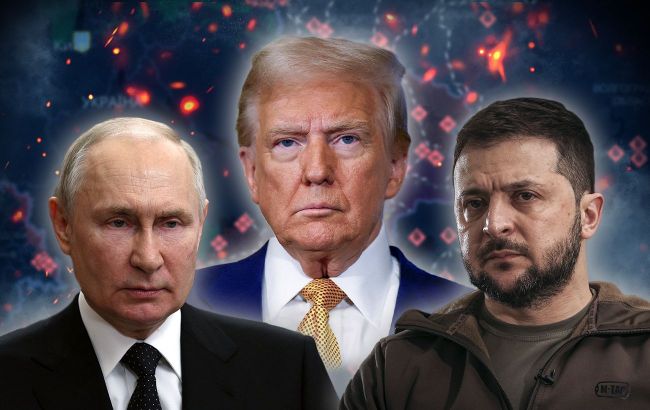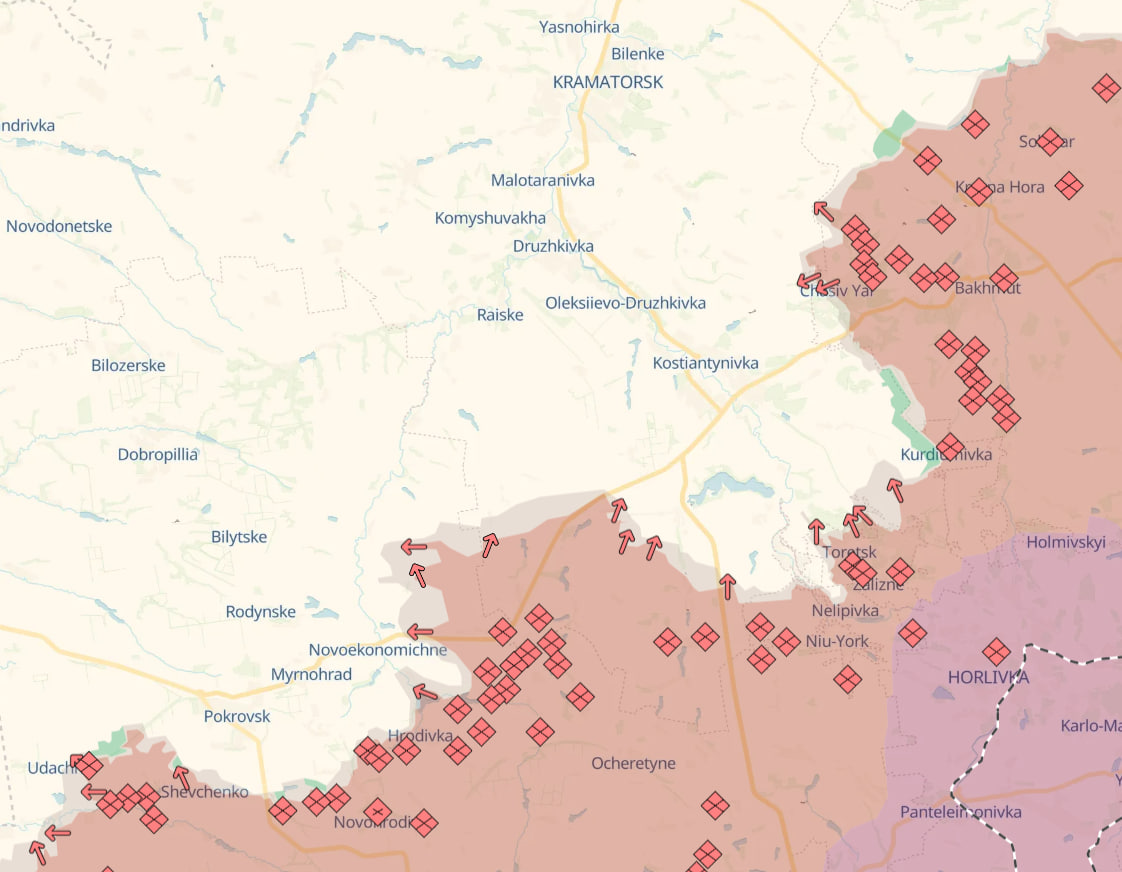Trump stalls, Putin pushes forward: Why Russia's war against Ukraine may drag on until 2026
 Due to Trump's position, the end of Russia's war against Ukraine does not look like a close prospect (collage: RBC-Ukraine)
Due to Trump's position, the end of Russia's war against Ukraine does not look like a close prospect (collage: RBC-Ukraine)
While Russia is developing a summer offensive on the front lines and increasing strikes at Ukrainian cities, the US is in no hurry to increase military aid to Ukraine or impose new sanctions against Moscow. Does this mean that, despite Donald Trump's promises, the war will not end in 2025? RBC-Ukraine explores these issues.
Key questions
- What Russia plans to do next on the front lines - ISW assessment?
- Why is Trump not putting pressure on Russia?
- Why do experts consider the end of the war in 2025 unlikely?
- What could change this assessment?
- Could the US still impose sanctions against Russia?
After the second round of Ukrainian-Russian negotiations in Istanbul, the US should realize that the time for amicable talks with Moscow is over. Putin is not willing to make any compromises or agree to reasonable conditions for ending the war.
The Donald Trump administration should move on to tough measures that will force the Kremlin to cease fire and curb its appetites. And the US president and Congress would direct a new record package of military aid to Ukraine.
Trump could issue an ultimatum to Putin: either he immediately stops the fighting and engages in serious negotiations with reasonable conditions, or within 24 hours, the White House will impose its painful sanctions against Russia, and Congress will begin consideration of the Graham-Blumenthal bill, which will be passed within a few weeks. The Kremlin would give in, initiate an indefinite ceasefire, and begin preparing a revised memorandum with its vision for a complete end to the war.
This could have been a realistic forecast for the war's development, at least for the first half of 2025. However, the first six months are already behind us, and it is now clear that events have followed a different scenario.
Time of bad scenarios
The chance of ending the fighting this year largely depends on the actions (or inaction) of the US president. Washington understands that, given the situation in Ukraine and Russia, there is no sign of common ground on ending the war.
The US cannot openly force Kyiv to make concessions to Moscow, and it seems unwilling to do the opposite. This may be due to Donald Trump's belief that he can still end this conflict through diplomacy. Or it may be due to a reluctance to confront Russia in order not to cloud the prospects for future joint business projects.
"Sometimes you see two young children fighting like crazy. They hate each other, and they’re fighting in a park, and you try and pull them apart. They don’t want to be pulled. Sometimes you’re better off letting them fight for a while and then pulling them apart," Trump said in early June.
His current logic — however cynical it may seem — may be as follows: let Russia and Ukraine continue to fight until one of them matures enough to make greater compromises. And now, as Moscow develops its summer offensive campaign and intensifies its massive shelling of frontline and rear cities, the end of the war no longer seems so close.
 Russia may focus its efforts in the summer on an offensive against Kostiantynivka (map: DeepState)
Russia may focus its efforts in the summer on an offensive against Kostiantynivka (map: DeepState)
"On March 11, Ukraine officially announced that it was ready to cease fire for 30 days without any conditions. Russia refused and instead is engaged in imitation negotiations because Putin, his generals, and elites, especially those of the old guard, are confident that if Trump stops military aid, they can break Ukraine. What is the point of making any concessions? That is why they are making maximum demands, comparable to the ultimatum of February 2022," says Mykhailo Samus, director of the New Geopolitics Research Network platform.
The American Institute for the Study of War (ISW) also does not believe that a complete cessation of hostilities in 2025 is likely, given Russia's determination to continue its military campaign in Ukraine and its lack of interest in reaching a meaningful ceasefire agreement.
"Russia will continue to pursue advances in Donetsk Oblast and look for vulnerabilities in Ukrainian defenses. Russian forces will likely intensify offensive operations around when the last presidential drawdown authority aid to Ukraine from 2024 runs out. Russia may attempt to escalate its offensive operations on some frontlines in Ukraine, such as in the Kostiantynivka, Zaporizhzhia, or Sumy direction in an effort to weaken Ukrainian defenses," says Russia Analyst and Deputy Team Lead of the ISW analytical group Kateryna Stepanenko.
The Institute for the Study of War believes that Moscow's summer offensive will focus on the Kostiantynivka direction. Russian troops are likely to continue to achieve tactical successes and capture fields and villages, but are unlikely to achieve operationally significant breakthroughs, Stepanenko notes. These offensive actions may be part of the Kremlin's information campaign aimed at convincing the West that further support for Ukraine is futile and that Russia's victory is inevitable, the ISW suggests.
"Russian forces, however, are unlikely to make large-scale breakthroughs as they continue to sacrifice large numbers of people and military equipment to sustain marginal advances. Russia will likely continue to escalate its drone and missile strike campaign against Ukraine - especially in the winter - in hopes of breaking Ukrainian will and coercing Ukraine into capitulation," Stepanenko assesses.
In order to freeze the war, Putin needs to feel a real threat of losing resources to continue the fighting and fill the treasury, Samus says. If he is faced with an inevitable choice between good and very bad options - gradual lifting of sanctions and joint business with the United States, or significant financial cuts due to new sanctions - only then will he be motivated to cease fire.
"Putin will definitely try to extend his summer campaign on the frontline, but it is already obvious that it will end in nothing for him. The only thing he can do is continue to terrorize Ukrainian cities with his Shaheds. Although it is unlikely that this will have any effect on the frontline and Ukraine's overall position. If we continue to talk to Putin about hockey, and then he earns hundreds of billions of dollars and kills Ukrainians, he will have no motivation to even think about ending the war," Samus reflects.
Does all of the above mean that the war's transition to 2026 is a foregone conclusion and an irreversible fact? No, it doesn't. There are at least two variables that can adjust and influence this scenario.
Chance for optimistic scenarios
At the moment, Trump has not declared his intention to increase military aid to Ukraine beyond what was already approved under his predecessor. Nor does he appear to be planning to impose any additional sanctions on Russia. The media have already reported that the US president asked senators to postpone consideration of the bill on the so-called hellish anti-Russian sanctions until July. Therefore, it seems unlikely that this document will be adopted by September, but by the end of the year, Congress may take up its consideration, Samus suggests.
 US Senators Richard Blumenthal of the Democratic Party and Lindsey Graham of the Republican Party in Kyiv (photo: RBC-Ukraine, Vitalii Nosach)
US Senators Richard Blumenthal of the Democratic Party and Lindsey Graham of the Republican Party in Kyiv (photo: RBC-Ukraine, Vitalii Nosach)
This fall, the political confrontation between Republicans and Democrats will intensify in the United States with an eye toward the congressional by-elections to be held in November 2026. The ratings of the Republican Party and Trump himself are already showing negative trends. If this trend continues, they risk losing their majority in both the House and Senate next fall. One of the easiest ways to avoid this scenario is to demonstrate Trump's strength against Putin, Samus believes.
"In all other areas - whether it is tariffs, the domestic situation, or even the war between Iran and Israel - the White House can get very negative results. Against this backdrop, the Russian-Ukrainian war is the least painful for the United States because it does not affect it directly. Therefore, amid the escalation of the political struggle in September-November 2025, a bill on sanctions against Russia may still be introduced in Congress. And by the end of the year, it is realistic that the United States may begin the process of imposing sanctions," the expert predicts.
Abbas Gallyamov, a political analyst, suggests that the US turn away from Russia may happen earlier. On the one hand, Moscow has something that interests the White House - potential joint business projects, favorable attitudes toward Iran, and possibly China. And these factors largely explain Trump's rather restrained stance toward Putin. But there are also arguments in favor of Ukraine, Gallyamov clarifies.
"Ukraine has signed a minerals deal. In addition, public opinion in the United States is on the side of Ukraine, so an outright surrender of Ukraine to Russia would be a political defeat for Trump. And European public opinion also clearly supports Ukraine. Members of his team can say whatever they want about Europe, but this does not negate the fact that it has been a key strategic partner of the United States for many decades. If Trump quarrels with Europe, particularly over the Ukrainian issue, it may begin to move closer to China," the political analyst says.
Trump is currently focused on Iran, which is why he may be more accommodating to Moscow, so as not to push it to direct military support for Tehran. But after the situation in the Middle East is resolved, Putin's importance to him will fall, Gallyamov suggests. And then, according to him, the White House may again take up sanctions against Russia and arms supplies to Ukraine, or use other levers of pressure on the Kremlin to make peace.
"That is, Trump may give Putin an ultimatum: either end the war on acceptable terms, or in a month, there will be sanctions or the start of the process of Ukraine's accession to NATO. In addition, if the story with Iran looks like Trump's victory, if the ayatollahs' regime weakens or gives up its nuclear program, then he, feeling on a horse, may start acting tougher - both toward Xi Jinping and Putin and others. If all this ends in a fiasco, Trump himself will act more restrained," he predicts.
 Trump with Israeli Prime Minister Netanyahu (photo: GettyImages)
Trump with Israeli Prime Minister Netanyahu (photo: GettyImages)
Another variable that may affect the scenarios for ending the war is the economic endurance of Russia itself. Numerous analytical estimates have predicted that, with current revenues and expenditures, it will be extremely difficult for Moscow to continue the war from 2026 onward. Russia's spending on the army is already eating away at its investments in education, infrastructure, or healthcare. Its main budget cushion, the National Welfare Fund, will be exhausted by the middle of next year.
Moscow is unable to restore many elements of sophisticated equipment due to the Western blockade, and the stocks of Soviet armored vehicles are set to run out by the end of this year. Russia is already experiencing a shortage of labor and human resources to implement its plans at the front. The main source of the Kremlin's economic endurance is oil revenues.
Previous trends showed that with low oil prices, the Russian economy would be in a very difficult situation at the end of this year, Samus notes. This, he says, combined with 500% duties on Russian oil, gave cautious optimism for predictions that Putin would be forced to freeze the war or ceasefire. After all, if Urals prices were at $40 by the end of the year, Moscow would have an empty treasury.
"Without sharp spikes in oil prices, Russia's safety margin was at its limit. It was vital for them to end the war in 2025, because otherwise their economy could face very serious problems and, as a result, internal crises," Fedir Venislavskyi, a member of the Verkhovna Rada Committee on National Security, Defense and Intelligence, told RBC-Ukraine.
But if the escalation in the Middle East continues and Iran moves to block the Strait of Hormuz, world oil prices will rise significantly, as will Russia's safety margin. Conversely, if the war between Iran and Israel calms down, the chances of the war ending this year will increase, Venislavskyi believes.
"If Trump's position changes and, despite a significant increase in oil prices, the sanctions proposed by Ukraine's supporters in Congress are imposed on Russia, this could also be painful for Moscow. Consequently, this may also encourage Putin to end the war this year. That is, either Trump will push Russia to end the war, or oil prices will fall, which could also be a problem for the Kremlin. Although these factors are likely to play in combination," he says.
Putin is now guided by the belief that his arguments on the battlefield can force Ukraine to accept Moscow's surrender demands. That is why the Kremlin decided to launch a summer offensive campaign, putting negotiations and its economic realities on the back burner.
Putin cannot help but know that his economy is steadily moving toward a conventional point from which it will be difficult to recover, as his ministers and the head of the central bank have already publicly stated. Therefore, if Russia's summer offensive fails, the Kremlin may try to reconsider the price it is willing to pay for the continuation of the war and move from sham to real negotiations.

